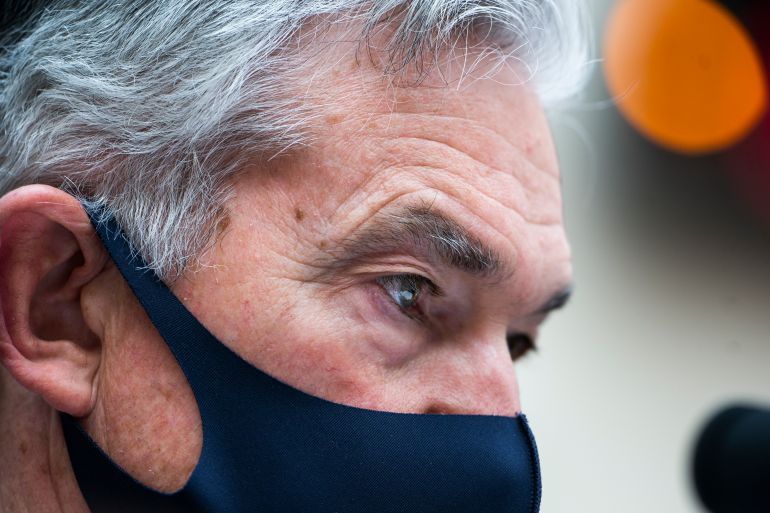Fed’s Powell: US economic recovery hinges on vaccination drives
‘There’s nothing more important to the economy than people getting vaccinated,” Powell told reporters during a virtual press conference on Wednesday following the Fed’s two-day policy meeting.

Federal Reserve Chairman Jerome Powell on Wednesday said that the United States’ economic recovery hinges on the progress of vaccination drives.
“There’s nothing more important to the economy than people getting vaccinated,” Powell told reporters during a virtual press conference following the Fed’s two-day policy meeting.
Keep reading
list of 4 itemsMexico’s teachers seek relief from pandemic-era spike in school robberies
‘A bad chapter’: Tracing the origins of Ecuador’s rise in gang violence
Why is the US economy so resilient?
Powell added that he has been vaccinated once and expects to get his second jab “soon”.
As expected, Fed policymakers voted unanimously to keep the central bank’s benchmark interest rate unchanged at near zero. In a post-meeting statement, the Fed said that the pace of the rebound in US economic activity since the depths of the COVID-19 crisis has “moderated in recent months with weakness concentrated in the sectors most adversely affected by the pandemic”.
Powell highlighted those sectors to reporters, noting that nearly half a million jobs were shed by the leisure and hospitality sector in December, “largely from restaurants and bars”.
He also noted – as he often has – that the economic fallout of the pandemic has disproportionately hit low-wage workers and minorities.
“In particular, the high level of joblessness has been especially severe for lower-wage workers in the service sector. And for African Americans and Hispanics,” he said.
Powell said that while some sectors of the economy such as housing have fully recovered, and sales of durable goods – items designed to last three years or more – and goods manufacturing have picked up, “we’re just not going to be able to get that last group of people back to work and it’s a big group of people, until we get the pandemic behind us”.
In their post-meeting statement, Fed policymakers reiterated their previous commitment to not raise borrowing costs until the nation’s labour market heals – even if it means allowing inflation to run above the Fed’s two-percent target rate for a while. The Fed also said it would continue buying at least $120bn worth of US Treasuries and mortgage-backed securities to help nurse the economy back to health.
Myriad economic indicators have been signalling that the US economic recovery is faltering and in need of a shot of adrenaline.
Weekly jobless claims, a proxy for layoffs, are still stubbornly high, with the latest reading from the US Labor Department showing 900,000 people applied for state unemployment benefits in the week ending January 16 – significantly higher than the 200,000 weekly average right before the pandemic struck.
The economy lost 140,000 jobs in December and the unemployment rate was 6.7 percent – nearly twice the level that it was just prior to the pandemic.
US President Joe Biden has proposed a new, massive $1.9 trillion stimulus package to accelerate the nationwide vaccination drive, and give more financial help to struggling households, small businesses and communities that have borne the brunt of the pandemic’s economic fallout.
The measures include giving an additional $1,400 direct cash transfer to qualifying Americans – in addition to $600 stimulus cheques included in December’s $900bn round of virus relief aid – and boosting the federal weekly top-up to state unemployment benefits from $300 to $400.
Democrats now control both houses of Congress – which ultimately controls the nation’s tax and spending policies – but many Wall Street analysts expect horse-trading with Republicans to chip away at the size and scope of Biden’s proposed stimulus.